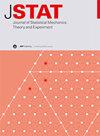受记忆重置影响的密闭扩散粒子的幂律松弛
IF 1.9
3区 物理与天体物理
Q2 MECHANICS
Journal of Statistical Mechanics: Theory and Experiment
Pub Date : 2024-07-14
DOI:10.1088/1742-5468/ad5a79
引用次数: 0
摘要
我们研究了具有长程记忆的布朗粒子在一维约束下的弛豫。粒子在任意约束势中扩散,并在随机时间重置到之前访问过的位置,重置概率与粒子自初始时间以来在当地停留的时间成正比。这一模型模拟了自然界中观察到的动物在其家园范围内无规律地移动,并不时地优先返回熟悉的地方。位置的稳态密度由平衡吉布斯-波尔兹曼分布给出,就像在标准扩散中一样,而密度的瞬态部分可以通过将过程的福克-普朗克方程映射为薛定谔特征值问题来获得。由于记忆的存在,后期向稳态的接近是关键性的自组织,即始终遵循缓慢的幂律形式,这与马尔可夫过程的指数衰减不同。这种幂律的指数以一种简单的方式取决于重置率和布朗粒子在无重置情况下的领先松弛率。我们将这些发现应用于几个可精确求解的例子,如谐波势、V 型势和箱势。本文章由计算机程序翻译,如有差异,请以英文原文为准。
Power-law relaxation of a confined diffusing particle subject to resetting with memory
We study the relaxation of a Brownian particle with long range memory under confinement in one dimension. The particle diffuses in an arbitrary confining potential and resets at random times to previously visited positions, chosen with a probability proportional to the local time spent there by the particle since the initial time. This model mimics an animal which moves erratically in its home range and returns preferentially to familiar places from time to time, as observed in nature. The steady state density of the position is given by the equilibrium Gibbs–Boltzmann distribution, as in standard diffusion, while the transient part of the density can be obtained through a mapping of the Fokker–Planck equation of the process to a Schrödinger eigenvalue problem. Due to memory, the approach at late times toward the steady state is critically self-organised, in the sense that it always follows a sluggish power-law form, in contrast to the exponential decay that characterises Markov processes. The exponent of this power-law depends in a simple way on the resetting rate and on the leading relaxation rate of the Brownian particle in the absence of resetting. We apply these findings to several exactly solvable examples, such as the harmonic, V-shaped and box potentials.
求助全文
通过发布文献求助,成功后即可免费获取论文全文。
去求助
来源期刊
CiteScore
4.50
自引率
12.50%
发文量
210
审稿时长
1.0 months
期刊介绍:
JSTAT is targeted to a broad community interested in different aspects of statistical physics, which are roughly defined by the fields represented in the conferences called ''Statistical Physics''. Submissions from experimentalists working on all the topics which have some ''connection to statistical physics are also strongly encouraged.
The journal covers different topics which correspond to the following keyword sections.
1. Quantum statistical physics, condensed matter, integrable systems
Scientific Directors: Eduardo Fradkin and Giuseppe Mussardo
2. Classical statistical mechanics, equilibrium and non-equilibrium
Scientific Directors: David Mukamel, Matteo Marsili and Giuseppe Mussardo
3. Disordered systems, classical and quantum
Scientific Directors: Eduardo Fradkin and Riccardo Zecchina
4. Interdisciplinary statistical mechanics
Scientific Directors: Matteo Marsili and Riccardo Zecchina
5. Biological modelling and information
Scientific Directors: Matteo Marsili, William Bialek and Riccardo Zecchina

 求助内容:
求助内容: 应助结果提醒方式:
应助结果提醒方式:


